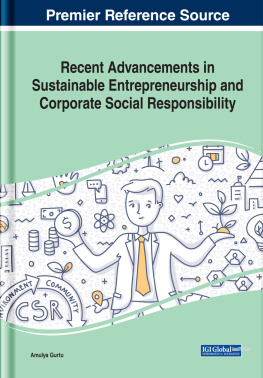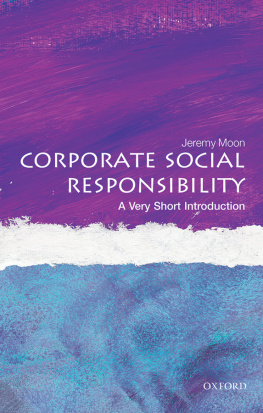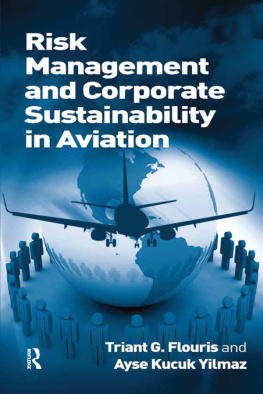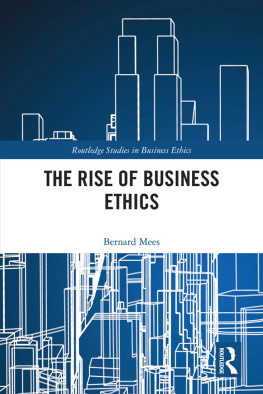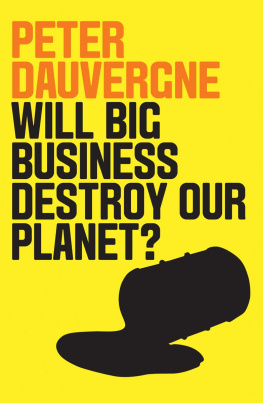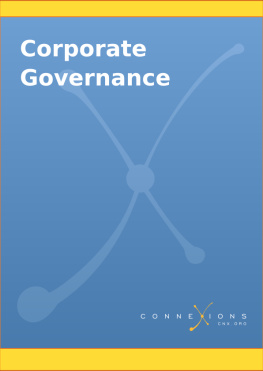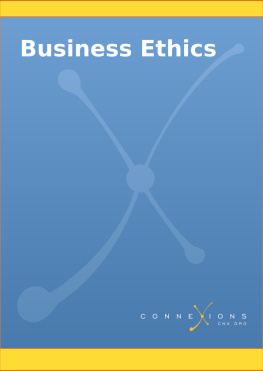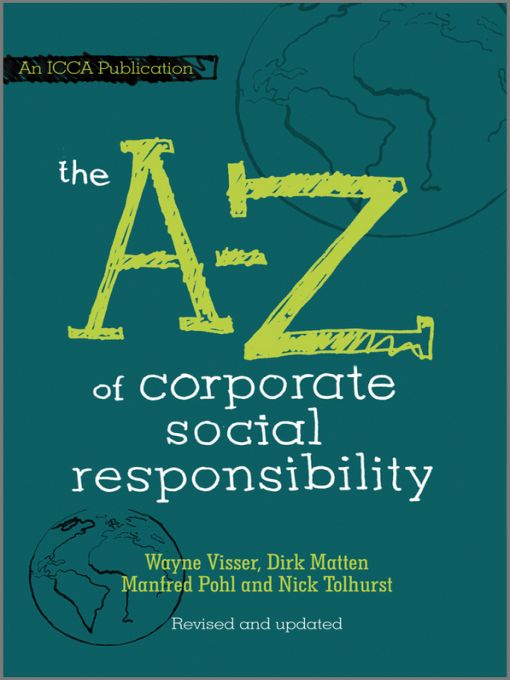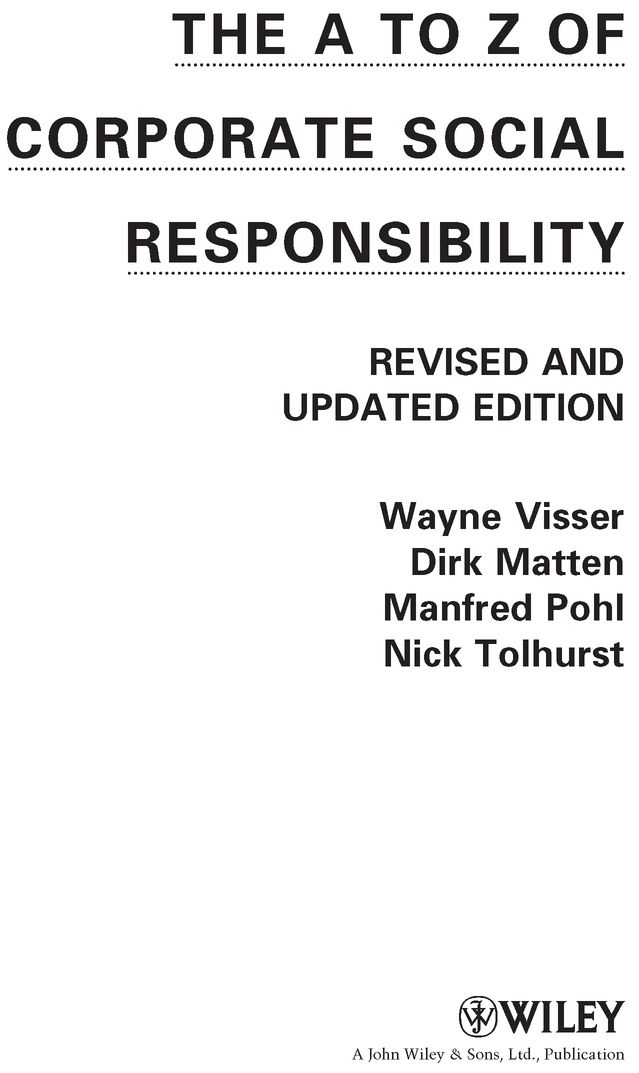Table of Contents
FOREWORD
With the near collapse of the global financial system from late 2007 onwards the realisation that business must move to more sustainable and transparent modes of operation became overnight the new conventional wisdom. It is with this in mind that as we came to completely revise the bestselling hardback version of The A to Z of CSR for the revised paperback version for 2010, we decided not only to update the previous entries and include the latest development in CSR, but also to incorporate completely new sections on the financial crisis and issues such as the continuing debates over boardroom pay etc.
Despite being exhaustively updated, the structure of the book remains essentially the same as the original idea of the founder of the Institute for Corporate Culture Affairs (ICCA), Prof. Manfred Pohl, and its Chairman Takis Arapoglou who have for some time called for CSR, corporate ethics and sustainability to move beyond the stage of a specialist or niche subject and become an integral part of global business and society.
Indeed, despite the recent vogue for CSR, much writing on CSR and related themes has seemed to concentrate on the parochial or in specialised areas. Another problem is the lack of a common language between business and academia in this field. Debates on Corporate Social Responsibility often involve communication between vastly different groups in society: from international NGOs to national governments to global companies and the local communities in which they operate. The very scope of the debates involved, and the actors participating, leads to the necessity of a common language. Yet it is this fundamental aspect which is at present missing - and it is this lacuna that this book intends to fill. What is even meant by corporate social responsibility? In what way are corporations viewed as citizens of the countries in which they operate? How does a company know when it is operating in a sustainable way? And what is ethical investment? As well as providing answers to these questions, The A to Z of CSR also lists and describes the most important organisations and landmarks in the field of CSR. What, for example, are the Global Compact Principles and how did they come about? Which are the most respected ethical business indices and what do they measure?
Working with over 100 experts and opinion formers around the globe we are convinced that this revised edition will build upon the success of the best selling original version and will continue to make a timely and innovative contribution to the literature. The book is ultimately intended to constitute the definitive guide to CSR, Sustainability, Business Ethics and the organisations and standards in this field.
The ICCA would like to thank all participating authors as well as all those who contributed towards the realisation of this project, in particular the following: Malcolm Macintosh, Andrew Dunnett, Peter Lacy, Andrew Crane, Jeremy Moon, Bryan Cress, Judy Muthuri, May Seitanidi, Nicola McClellan and John Luff, who have so generously contributed towards this publication. We greatly appreciate your time, commitment and good advice. We would also like to thank all those involved, both our members and our partners, whose inspiration and hard work contributed towards the realisation of this book. In particular, we would like to thank Deutsche Bank and ICCA s Chairman Takis Arapoglou of the National Bank of Greece whose steadfast support of this project made this publication possible.
Board of Editors:
Katja Bhmer
Aron Ghebremariam
Judith Hennigfeld
Sandra S. Huble
Dirk Matten
Manfred Pohl
Nick Tolhurst
Wayne Visser
1st May, 2010
Frankfurt am Main
THE A TO Z OF CSR - INTRODUCTION
Wayne Visser and Dirk Matten
This A to Z of CSR has been compiled to help managers, consultants, teachers and researchers navigate their way through the plethora of terms, codes and organisations associated with CSR. We like to think of it as a jargon-busting guide to CSR. By way of introduction, we would like to comment briefly on four aspects of the publication, namely the context, scope, contributors and structure.
CONTEXT
CSR has won the battle of ideas - even the sceptical survey on CSR in the Economist in January 2005 conceded this much. And it is true. While the idea has been around for some five decades by now, the last 15 years have seen an unprecedented rise of CSR language, tools, actors, strategies and practices in industry all over the world. With the fall of the iron curtain and the advent of globalisation, it is business, rather than nation state governments, that have faced growing demands to address issues of societal concern and to be responsible and accountable members of our global society. Next to these developments, it is somewhat ironic to see that the very doctrines of Milton Friedman and his liberal friends - who severely criticised CSR - have led us to a situation of increased demand for CSR. The implementation of their ideas in most industrialised countries over the last two and a half decades has resulted in a situation where deregulated free markets, privatised public services and a liberalised global economy have put corporations right at the centre of public concern.
But CSR as an approach to responsibly managing an organisation is not just a topic for the business community. Increasingly, we see governments involved in promoting and fostering CSR, most notable the UK government with its CSR minister and the EU with its White Papers and the recent European Alliance for CSR. Furthermore, governments themselves, which are still responsible for roughly half of the GDP in most developed democracies, increasingly face calls for more responsible, accountable and transparent behaviour very similar to those addressed at corporations. Hence, governments all over the world are deeply involved in developing and implementing many of the CSR ideas explained in this volume. Non -governmental organisations (NGOs), for a long time the independent conscience or police which played a role in translating the concerns of civil society to corporations, have recently also become engaged in the CSR agenda. This has happened in part because growing CSR practices have involved various forms of collaboration, partnerships and joint initiatives between the corporate and NGO sectors. Another reason, however, is the rise in membership, budgets and global reach of these often multinational organisations. As such, NGOs face questions similar to those on the corporate CSR agenda: In whose interest do they act? To whom are they accountable? What practices are they using?
CSR then is not only a topic for business, but equally a subject for government and civil society or the NGO sector. And it is by no means confined to the developed world, or even its Anglo-American origins. Indeed, in some ways, the current growth in CSR is more marked in Europe, Japan, South Korea or Taiwan, while the rise of India and China as key players in the global economy has given CSR a firm place on their agenda as well. The presence of big business in the developed world is even argued by many to be one of the strongest drivers for CSR, not only for Western multinationals, but also for indigenous companies. In fact, companies are increasingly viewed as a beacon of hope with regard to fighting poverty, promoting economic development and showcasing an alternative in otherwise often poorly governed economies and societies.



